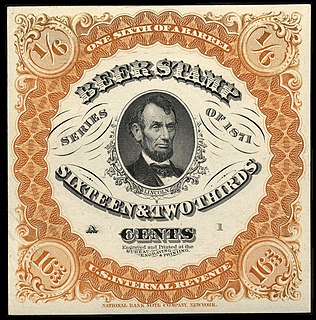
A tax is a compulsory financial charge or some other type of levy imposed on a taxpayer by a governmental organization in order to fund government spending and various public expenditures. A failure to pay in a timely manner, along with evasion of or resistance to taxation, is punishable by law. Taxes consist of direct or indirect taxes and may be paid in money or as its labour equivalent. The first known taxation took place in Ancient Egypt around 3000–2800 BC.
Excise tax in the United States is an indirect tax on listed items. Excise taxes can be and are made by federal, state and local governments and are not uniform throughout the United States. Certain goods, such as gasoline, diesel fuel, alcohol, and tobacco products, are taxed by multiple governments simultaneously. Some excise taxes are collected from the producer or retailer and not paid directly by the consumer, and as such often remain "hidden" in the price of a product or service, rather than being listed separately.

Taxes in New Zealand are collected at a national level by the Inland Revenue Department (IRD) on behalf of the Government of New Zealand. National taxes are levied on personal and business income, and on the supply of goods and services. There is no capital gains tax, although certain "gains" such as profits on the sale of patent rights are deemed to be income – income tax does apply to property transactions in certain circumstances, particularly speculation. There are currently no land taxes, but local property taxes (rates) are managed and collected by local authorities. Some goods and services carry a specific tax, referred to as an excise or a duty, such as alcohol excise or gaming duty. These are collected by a range of government agencies such as the New Zealand Customs Service. There is no social security (payroll) tax.
The history of the English fiscal system affords the best known example of continuous financial development in terms of both institutions and methods. Although periods of great upheaval occurred from the time of the Norman Conquest to the beginning of the 20th century, the line of connection is almost entirely unbroken. Perhaps the most revolutionary changes occurred in the 17th century as a result of the Civil War and, later, the Glorious Revolution of 1688; though even then there was no real breach of continuity.

An excise, or excise tax, is any duty on manufactured goods that is levied at the moment of manufacture rather than at sale. Excises are often associated with customs duties ; customs are levied on goods that become taxable items at the border, while excise is levied on goods that came into existence inland.
Taxation in Norway is levied by the central government, the county municipality and the municipality. In 2012 the total tax revenue was 42.2% of the gross domestic product (GDP). Many direct and indirect taxes exist. The most important taxes – in terms of revenue – are VAT, income tax in the petroleum sector, employers' social security contributions and tax on "ordinary income" for persons. Most direct taxes are collected by the Norwegian Tax Administration and most indirect taxes are collected by the Norwegian Customs and Excise Authorities.
Tekalif-i orfiye was a type of taxation in the Ottoman Empire.
Nüzül was a tax in the Ottoman Empire.
Muafiyet was a tax exemption mechanism for Ottoman towns or villages; an individual decree of tax exemption was called a muafname.
An emin was an officer in the Ottoman empire; a "steward", the holder of an eminet, and often responsible for customs duties. Unlike a timar holder, an emin was a salaried official. Emins could operate outside the normal Ottoman bureaucracy; they were not necessarily Muslim.
Taxation in the Ottoman Empire changed drastically over time, and was a complex patchwork of different taxes, exemptions, and local customs.
The damga resmi was a form of stamp duty in the Ottoman Empire.
The gümrük resmi was a customs charge, or tax, in the Ottoman Empire. In modern-day Turkey the term continues to be in use: Gümrük vergi ve resimleri.
Müskirat resmi was a tax on alcohol in the Ottoman Empire.
Temettu was a tax introduced by the tanzimat reforms in the later Ottoman Empire.
The tapu resmi was a feudal land-registration tax in the Ottoman Empire.
Ihtisab, or ihtisap was a type of tax on markets in the Ottoman Empire; the muhtasib or ihtisap ağasi - the ihtisab collector - had a broader role in regulating and taxing markets under the authority of the kadı.
Fiscal policy are "measures employed by governments to stabilize the economy, specifically by manipulating the levels and allocations of taxes and government expenditures. Fiscal measures are frequently used in tandem with monetary policy to achieve certain goals." In the Philippines, this is characterized by continuous and increasing levels of debt and budget deficits, though there have been improvements in the last few years.
The Régie Company was a parastatal company formed in the later Ottoman Empire by the Ottoman Public Debt Administration, with backing from a consortium of European banks. The company had a monopoly over tobacco production. Revenue from the Regie Company was supposed to help overcome the Ottoman state's persistent shortage of income. The Regie Company constituted the largest foreign investment in the Ottoman Empire, and it attempted to introduce more efficient production methods - against local resistance.
The German tariff of 1879 was a protectionist law passed by the Reichstag that imposed tariffs on industrial and agricultural imports into Imperial Germany.


